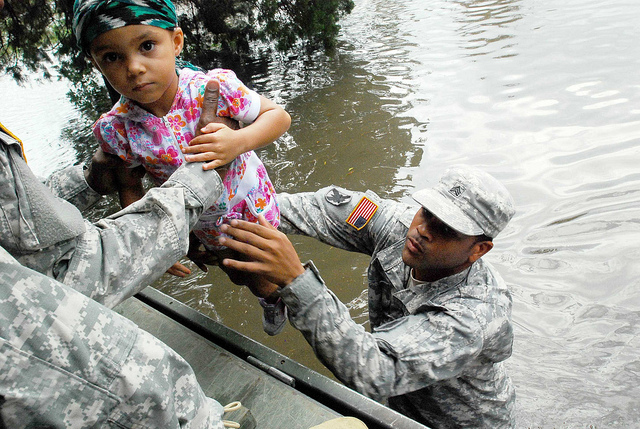
While the catastrophic flooding by Hurricane Florence made recent headlines, the emotional trauma it caused — particularly for children — may be overlooked. A growing approach to natural disasters as “social phenomena” with social consequences sheds light on how storms, earthquakes, and wildfires impact the emotional health of young survivors. In a recent article in The Atlantic, sociologist Alice Fothergill discusses her research on the emotional turmoil caused by Hurricane Katrina.
Fothergill finds that lack of communication with friends and family during a storm leads to tremendous anxiety for children. However, children who stay together with family in unsafe conditions also suffer. She explains,
“In a lot of studies, we find that kids who experience the intensity of the event do have a harder time coping. It really is important to evacuate and not be in it. Being with family is important, [but so is] not feeling like they’re in a life-threatening situation.”
The good news is, emergency responders are learning. Fothergill notes that during Hurricane Katrina, many kids in foster families and their biological parents completely lost contact and family records were destroyed in the storm. However, during Hurricane Sandy, the Department of Children and Families in New Jersey was able to learn from these mistakes.
Fothergill says one of the best things to do is to allow children to help prepare for the storm — for example, let them have a say in what comes in the car and what stays at home — so they feel like they have some control over the situation. While Fothergill notes that children are especially vulnerable to trauma, they are also very resilient; for this reason, showing them how to prepare and rebuild after a deadly storm can make all the difference.

Comments 4
Aleksander — November 28, 2018
We volunteers of ALLATRA International Public Movement do everything we can to learn how to overcome the consequences of such events https://allatra.tv/en/article/the-climate-control-global-project
Alexander — November 28, 2018
We in the International Public Movement ALLATRA try to inform people about global climate changes taking place on Earth
<a href="https://allatra.tv/en/article/the-climate-control-global-project
Kajalji — September 12, 2022
If today I am not coming here I just lost or I just miss that amazing saving to humans work done my army. Salut to all amry man..
Prepaid Gift Balance
Bert Price — December 12, 2022
While most persons exposed to disaster rebound quickly from transient distress reactions, others progress to psychopathology including PTSD, major depression, anxiety disorders, and substance abuse. Those who lose loved ones in a natural disaster are likely to grapple with complicated grief.
PeopleNet Fleet Manager